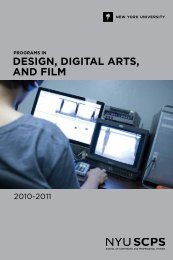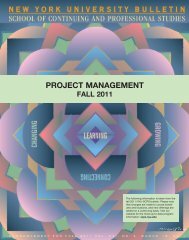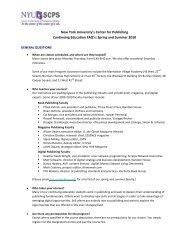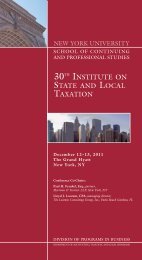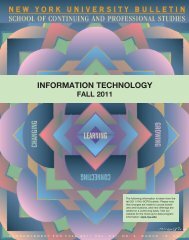NYU 70th Institute on Federal Taxation - School of Continuing and ...
NYU 70th Institute on Federal Taxation - School of Continuing and ...
NYU 70th Institute on Federal Taxation - School of Continuing and ...
- No tags were found...
Create successful ePaper yourself
Turn your PDF publications into a flip-book with our unique Google optimized e-Paper software.
NETWORKING RECEPTION5 p.m. It’s never been more valuable or vital to c<strong>on</strong>nect with colleagues at <str<strong>on</strong>g>NYU</str<strong>on</strong>g>’sannual recepti<strong>on</strong>. Please be our guest for cocktails <strong>and</strong> hors d’oeuvres <strong>and</strong> takethe opportunity to meet <strong>and</strong> greet our distinguished speakers, sp<strong>on</strong>sors, <strong>and</strong>advisory board members. Also, enjoy this time to meet <strong>and</strong> network withfellow tax pr<strong>of</strong>essi<strong>on</strong>als from around the country.DAY 4: WEDNESDAY, OCT. 26/NOV. 168 a.m. C<strong>on</strong>tinental BreakfastSingle-Day Registrati<strong>on</strong> <strong>and</strong> Distributi<strong>on</strong> <strong>of</strong> MaterialsCLOSELY-HELD BUSINESSESChair: Jerald David August, Esq., partner, Fox Rothschild LLP, Philadelphia, PA& West Palm Beach, FL8.30 a.m. ESTATE PLANNING “FREEZES” OF INTERESTS IN CLOSELY-HELD BUSINESS ENTITIESA practical guide to use <strong>of</strong> entity freeze techniques to transfer wealth with aminimum <strong>of</strong> tax “fricti<strong>on</strong>.” Whether you are looking to shift assets out <strong>of</strong> thecorporate soluti<strong>on</strong> or to transfer future appreciati<strong>on</strong> <strong>of</strong> closely-held businessassets to the next generati<strong>on</strong>, the entity freeze technique <strong>of</strong>fers significantpossibilities. This topic explores income, estate, <strong>and</strong> gift tax aspects <strong>of</strong> entityfreeze techniques, including use <strong>of</strong> a partnership or LLC to spin <strong>of</strong>f assetsfrom a C or S corporati<strong>on</strong>, <strong>and</strong> methods <strong>of</strong> maximizing basis step up <strong>on</strong> frozenassets which can also minimize tax c<strong>on</strong>sequences to transfers <strong>of</strong> assets withliabilities in excess <strong>of</strong> basis including leveraged real estate. This is whereincome tax planning <strong>and</strong> estate <strong>and</strong> gift tax planning truly c<strong>on</strong>verge.Stephen M. Breitst<strong>on</strong>e, Esq., partner, Meltzer, Lippe, Goldstein &Breitst<strong>on</strong>e LLP, Mineola, NY9.30 a.m. Refreshment Break9.45 a.m. THE ECONOMIC SUBSTANCE DOCTRINEThis segment discusses the historic role <strong>of</strong> ec<strong>on</strong>omic substance in the tax law<strong>and</strong> the possible role <strong>of</strong> ec<strong>on</strong>omic substance as a statutory c<strong>on</strong>cept. The sessi<strong>on</strong>particularly stresses the use <strong>and</strong> potential use <strong>of</strong> ec<strong>on</strong>omic substance in thec<strong>on</strong>text <strong>of</strong> partnerships <strong>and</strong> limited liability companies.Terence F. Cuff, Esq., partner, Loeb & Loeb LLP, Los Angeles, CA10.45 a.m. THE MEDICARE TAX IS GOING TO 3.8%? MAYBE WE SHOULDGO AHEAD AND MAKE THE S ELECTION!The 2010 Health Care Act increases the Medicare porti<strong>on</strong> <strong>of</strong> the self-employmenttax to 3.8% <strong>and</strong> subjects investment income, for the first time in the history <strong>of</strong>Social Security, to the Medicare tax. The new Medicare tax provisi<strong>on</strong>s areeffective for tax years beginning after December 31, 2012. A partner, an LLCmember, or an S corporati<strong>on</strong> shareholder will be exposed to the new 3.8%Medicare tax <strong>on</strong> net investment income attributable to his or her share <strong>of</strong> theoperating income <strong>of</strong> the partnership, LLC or S corporati<strong>on</strong>, as the case maybe, if the activity generating the income is “passive” under Secti<strong>on</strong> 469 withrespect to the taxpayer. The S electi<strong>on</strong> becomes more attractive than ever forthe closely-held business or a pr<strong>of</strong>essi<strong>on</strong>al practice, where the owners areactively involved in the business. The advantages <strong>of</strong> c<strong>on</strong>verting to S status inthe current envir<strong>on</strong>ment are analyzed through hypothetical fact patterns.C. Wells Hall, III, Esq., partner, Mayer Brown LLP, Charlotte, NC11.45 a.m. Lunch Recess8 For more informati<strong>on</strong>, call (212) 992-3320. Register <strong>on</strong>line at scps.nyu.edu/ift






